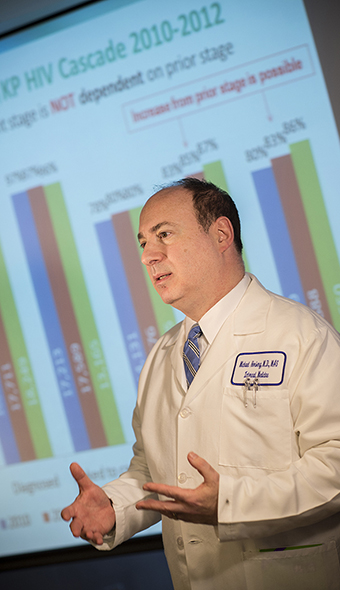The AMA recognized 4 Permanente Medical Groups for continuing efforts to support physician wellness with 2023 Joy in Medicine™ recognitions.
Treatment as prevention
Michael Horberg, MD, devotes career to transforming how HIV/AIDS patients are treated at Kaiser Permanente, throughout the U.S.
By Athan Bezaitis
The Permanente Federation

After almost four decades of battling HIV/AIDS, the disease is still considered an epidemic – more than 1 million Americans have the condition. But thanks in large part to the leadership of Michael Horberg, MD, and his Permanente colleagues, Kaiser Permanente is making significant strides to control its spread and to treat it.
Dr. Horberg first heard of AIDS in 1982 while in medical school attending a lecture called “Cocktail Party Medicine.” The discussion centered around puzzling illnesses in the media as topics likely to come up at social gatherings. One of those illnesses was GRID – gay-related immunodeficiency disease. Later that year, GRID would come to be known as acquired immune deficiency syndrome or AIDS, and in 1984 scientists would announce the discovery of the human immunodeficiency virus (HIV) as its cause.
During his early days in practice in Chicago, Dr. Horberg became drawn to helping patients with HIV and AIDS. “It was still a new disease,” he explains, “and there was so much new knowledge to acquire.”
Dr. Horberg embraced the challenge despite the fear and stigmatization that HIV/AIDS invoked. “At the time, the disease was still very much considered to be a disease of the gay community and other marginalized populations,” he says. “When I started in practice, physicians were still prescribing AZT, but it was proving to be an insufficient drug.” He began seeking out patients for clinical trials, the first step in a long career dedicated to caring for patients with HIV/AIDS with a strong focus on clinical research.
HIV/AIDS focus in an integrated care model
He was eventually recruited to The Permanente Medical Group, beginning his work at the Kaiser Permanente Santa Clara Medical Center. For the first time, he was free from the burdens of private practice, such as malpractice insurance and fee-for-service medicine. As part of an integrated delivery system he was able to focus on HIV/AIDS care as a priority.
“Physicians who come from private practice are the ones who appreciate KP the most,” he says.
Much of the transformation of how physicians treat people with HIV/AIDS can be credited to Dr. Horberg’s leadership at Kaiser Permanente and his guidance on improving care for HIV/AIDS patients across the country.
The next frontier is studying and understanding the long-term effectiveness of drugs in patients that are not HIV positive.
Today, HIV/AIDS is treated as an ongoing chronic condition. “We’ve gotten to the stage where we can manage patients with a one-pill daily regimen. And now we are treating their comorbidities – in the old days people didn’t live long enough for those,” explains Dr. Horberg. “Now we are working on things like getting them to stop smoking, and helping with depression and mental health.”
Part of the way Dr. Horberg and his colleagues have been successful at identifying what works is by using Kaiser Permanente’s robust electronic health record (EHR). “At Kaiser Permanente we treat one of the largest HIV disease populations in the country, and we are able to look at data in a critical way using our EHR and registries. That is how we are able to put systems in place and maintain quality of care,” says Dr. Horberg. “Today we are able to give physicians clear information and say ‘these are your patients who are not virally suppressed and here are the best ways you can care for them.’”
National role in HIV/AIDS care
In 2003, Dr. Horberg became the national HIV/AIDS leader for Kaiser Permanente. He has been instrumental in the development of Kaiser Permanente’s guidelines and best practices in treating HIV/AIDS, and is also a national leader in promoting HIV/AIDS research inside and outside the organization.
He served as chair of the HIV Medicine Association and in 2010 was invited to serve on President Obama’s Presidential Advisory Council on HIV/AIDS. In that role, he worked closely with the U.S. Department of Health and Human Services to set up national quality metrics and inform the national HIV/AIDS strategy. He’s honored to display a photo of himself and President Obama in his office.
Dr. Horberg is now the executive director of research, community benefit, and Medicaid strategy of Mid-Atlantic Permanente Medical Group (MAPMG) and the director of the Mid-Atlantic Permanente Research Institute (MAPRI). He remains the national director of HIV/AIDS for Kaiser Permanente.

In 2012, Dr. Horberg and his colleagues were able to keep 86 percent of Kaiser Permanente’s patients with HIV/AIDS at an undetectable viral load (and in many regions the percentage was even higher).
That same year, the U.S. Food and Drug Administration approved the first daily antiretroviral drug for pre-exposure prophylaxis (PrEP) for HIV prevention. If taken daily, PrEP has been shown to reduce the risk of HIV infection in people who are at high risk by up to 92 percent.
“In 2015 our physicians Jon Volk and Brad Hare, with support from TPMG, authored an article explaining that there were no new HIV infections in a large clinical practice setting of PrEP users, despite high rates of sexually transmitted diseases and decreases in condom use,” explains Dr. Horberg. “The next frontier is studying and understanding the long-term effectiveness of drugs in patients that are not HIV positive.”
Next: interdisciplinary care
Dr. Horberg believes there are several other areas ripe for future research. “Two of the areas we’re looking at now are cancer and chronic kidney disease in patients with HIV and AIDS – its causes and how to prevent it. We are looking at helping to further define quality metrics. We are looking at how to put together the best interdisciplinary care for HIV. We are studying the interplay between HIV and Hep C, and HIV/AIDS in older adults.”
Still, he finds time to interact with Permanente physicians caring for those at risk for HIV/AIDS in all the Permanente Medical Groups throughout the country. His advice to them is straightforward.
“Make sure every patient gets tested at least once. Make sure those at higher risk are tested more often. Offer them PrEP. And if they are HIV positive, please refer them to one of our HIV specialists. We are here to see these patients and to take care of them and to do it quite well.”


